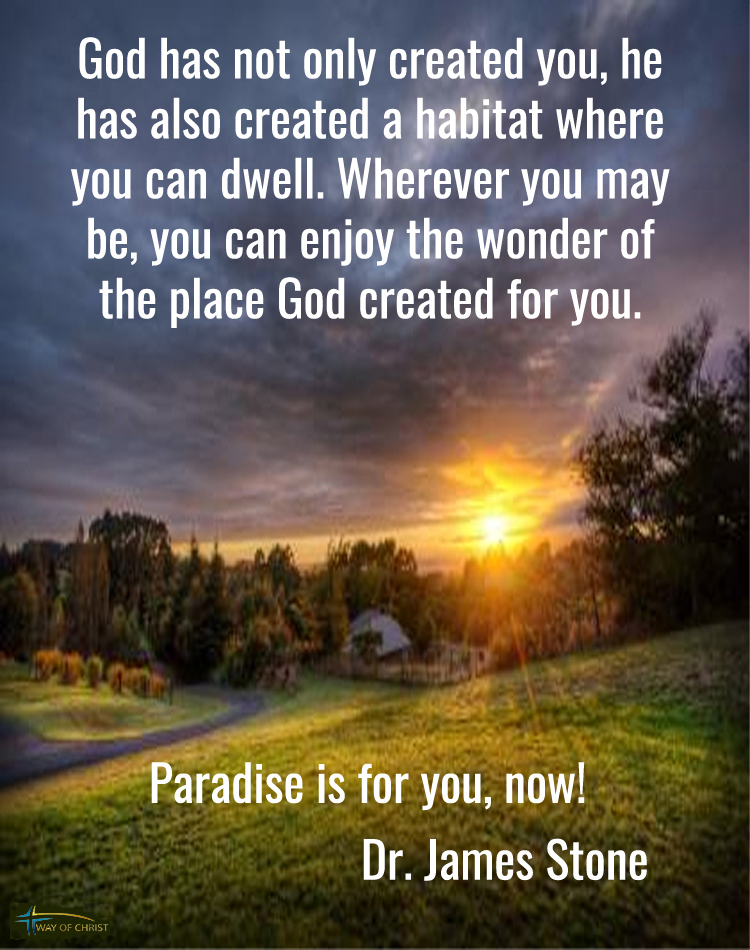Where is Paradise? It is not a way off out there somewhere. It can be experienced now!
What does Paradise mean in the Bible? I think we can identify that place, that habitat, which is called paradise and the conditions surrounding it. The King James Version has three references to paradise: Luke 23:43, 2 Corinthians 12:2, and Revelation 2:7. The original word that is translated paradise according to Strong’s Greek/Hebrew Definitions, means, “a park, that is (specifically) an Eden (a place of future happiness, “paradise”). Thayer’s Greek Lexicon adds, “among the Persians, it means a grand enclosure or preserve, hunting-ground, park; universally, a pleasure-ground; grove, park.”
In Revelation 2:7,
He that hath an ear, let him hear what the Spirit saith unto the churches; To him that overcometh will I give to eat of the tree of life, which is in the midst of the paradise of God.
Where is Paradise? It seems paradise has something to do with “overcometh.” The opening statements of Revelation illustrate:
The Revelation of Jesus Christ, which God gave unto him, to shew unto his servants things which must shortly come to pass; and he sent and signified it by his angel unto his servant John: Who bare record of the word of God, and of the testimony of Jesus Christ, and of all things that he saw. Blessed is he that readeth, and they that hear the words of this prophecy, and keep those things which are written therein: for the time is at hand (Rev. 1:1-3).
It seems that this book is not so much a revelation of Jesus Christ than it is the revelation that God gave to Jesus Christ. In turn, Jesus was to show these things to his servants (literal meaning of servants is slave). As we will see man does live in a deterministic world which includes the naturalistic tendencies of man. The question that must be raised is how does the freedom of man operate in the sovereignty of God.
Where is Paradise? The possibility to experience it is for every generation.
Whatever the mysteries of Revelation contain, John stated they are things that “must shortly come to pass.” He also stated
Blessed is he that readeth, and they that hear the words of this prophecy, and keep those things which are written: for the time is as hand.
Where is Paradise? John evidently believed that the “words of this prophecy” were for his day. He would say later that these same words were to be fulfilled in every generation, in every century, and in every age (Rev. 1:19).
After John wrote those challenging statements, he recorded,
John to the seven churches which are in Asia: Grace be unto you, and peace, from him which is, and which was, and which is to come; and from the seven Spirits which are before his throne; And from Jesus Christ, who is the faithful witness, and the first begotten of the dead, and the prince of the kings of the earth. Unto him that loved us, and washed us from our sins in his own blood, And hath made us kings and priests unto God and his Father; to him be glory and dominion forever and ever. Amen. (Rev. 1:4-6)
Although John wrote his letter to the “seven churches,” the emphasis of the letter seems to indicate that these seven churches serve as an example of the plight of the people of God in every age. Likewise, the “sevens spirit” does not indicated that there are seven Spirits of God, but rather that the same Spirit, one Spirit, can meet the different needs of all people in every age. In the age of John, God would send his Spirit to meet the needs of these seven different churches: seven different circumstances met by the one Spirit in seven different instances. The Spirit of God can meet the needs of every circumstance in every generation of believers. Where is Paradise? It is a possibility for every generation.
John desired that grace and peace would not only be from God, “which is, and which was, and which was to come,” from “the seven Spirits,” but also from Jesus Christ
who is the faithful witness, and first begotten of the dead, and the prince of the kings of the earth.
During the earthly journey of Jesus of Nazareth in response to two Greeks seeking for him, he said,
Verily, verily, I say unto you, Except a corn of wheat fall into the ground and die, it abideth alone: but if it die, it bringeth forth much fruit (John 12:24).
Jesus was referring to his death and resurrection and as such became the “first begotten of the dead.”
Jesus is the faithful witness to the revelation given to him by God. Life for man always comes out of the perishing of human flesh and the renewing of the Spirit of God within him (2 Cor. 4:16-5:4). Jesus was faithful in what God was doing in his life and became “the first begotten of the dead.”
Being the quicken power within believers, the raised Jesus would become “the prince [literally, the first power] of the kings of the earth.” Through Jesus Christ, believers could
replenish the earth, and subdue it: and have dominion over the fish of the sea, and over the fowl of the air, and over every living thing that moveth upon the earth (Gen. 1:28).
Through Jesus Christ, man could indeed be the ruler over the earth rather than being ruled by the happens of the earth. Being “washed” in the death and resurrection of Jesus Christ, every believer can be set free from his sins.
Then, John stated,
Behold, he cometh with clouds; and every eye shall see him, and they also which pierced him: and all kindreds of the earth shall wail because of him. Even so, Amen (Rev. 1:7).
Every since Jesus ascended into the heavenly realm (Acts 1:9) and returned in the power of the Holy Spirit (Acts 2:1-4), the risen Christ has been coming from the heavenly realm (represented here as cloudiness) into the lives of earthly people. No one that has every been born upon this earth has escaped coming face to face with the quickening power of life.
Every eye shall “see” the one from the heavenly realm and every man will “pierced” him as illustrated by Jesus weeping over the inhabitants of Jerusalem because they did not know the time of their visitation from God (Luke 19:41-44). Every person of every age has come face to face with the rigors of this life and they “wail” (literally, “beat their breast in grief) because the good life cannot be found in their effort. At this point, John recorded the words of Jesus,
I am Alpha and Omega, the beginning and the ending . . . which is, and which was, and which is to come, the Almighty (Rev. 1:8).
For our background of where is paradise, John concluded, with Revelation 2:7,
I John, who also am your brother, and companion in tribulation, and in the kingdom and patience of Jesus Christ, was in the isle that is called Patmos, for the word of God, and for the testimony of Jesus Christ (Rev. 1:9).
Where is Paradise? It was experienced by John in his day.
The revelation that God gave to Jesus Christ is not only in “the words of the prophecy” of the vision given to John on Patmos, it is also revealed in the life of John. He stated that he was a companion, a co-participant, in the pressure (tribulation) of life. He also stated that he was a co-participant in the kingdom and patience of Jesus Christ. Think about it. John lived the largest portion of his life as a believer in Jesus Christ. Then, toward the end of his life he found that he was being arrested and sent to be exiled in Patmos. I wonder if he ever thought that “this is not fair” especially after he had lived his life for God. What is even more compelling is the meaning behind the word patience. It means, “to cheerfully endure.”
Evidently, John did not experience gloom, despair, and agony about being exiled on Patmos. He saw that he was on the isle of Patmos, “for the word of God, and for the testimony of Jesus Christ.” What many would have felt to be a negative, John saw it as a positive. I am sure that John, at the time of his vision, did not comprehend the far-reaching effect of his writing on the thousands of years of church history that would follow, but I think he knew that he was where he should be.
Now, the understanding of our text verse,
He that hath an ear, let him hear what the Spirit saith unto the churches; To him that overcometh will I give to eat of the tree of life, which is in the midst of the paradise of God (Rev. 2:7),
is more clearly understood. Life is simply overcoming, eating of the tree of life, and living in paradise. Where is Paradise? Evidently, John knew the secret and was experiencing it.
Where is Paradise? It was experienced by the thief on the cross.
Probably, the most powerful example of being moved from tribulation to paradise in the Bible is the story of the thief on the cross. One of the criminals being crucified with Jesus said, “. . . if thou be Christ, save thyself and us” (Luke 23:39).
But the other answering rebuked him, saying,
Dost not thou fear God, seeing thou art in the same condemnation? and we indeed justly; for we receive the due reward of our deeds: but this man hath done nothing amiss (Luke 23:40-41).
Then, the first thief said, “Lord, remember me when thou comest into thy kingdom” (Luke 23:42). Jesus responded, “Verily, I say unto thee, Today shalt thou be with me in paradise” (Luke 23:43).
Where is Paradise? In the midst of the excruciating pain of death by crucifixion, Jesus said to the thief on the cross, “today you can be with me in paradise.”
The thief on the cross simply by Jesus speaking the words experienced paradise in that moment. Paul wrote to the Corinthians,
We shall all be changed in a moment in the twinkling of an eye at the last trump for the trumpet shall sound . . . .
The original word for trumpet means, “a quavering or reverberation” from “a vibration.” In the last moment of the quavering of trouble for the thief, God would raise him up to experience the fulfilled kingdom of God. Where is Paradise? It is indeed a great mystery, but the thief on the cross experienced it the same day as his physical life was being taken from him.
Where is Paradise? It was experienced by Paul.
Finally, in reference to our three words of paradise, after Paul wrote to the Corinthians, “It is not expedient for me doubtless to glory. I will come to visions and revelations of the Lord,” he stated,
I knew a man in Christ above fourteen years ago, (whether in the body, I cannot tell; or whether out of the body, I cannot tell: God knoweth;) such an one caught up to the third heaven . . . How that he was caught up into paradise, and heard unspeakable words, which it is not lawful for a man to utter (2 Cor. 12:1-4).
Although it is not capable to be fully explained, there seems to be a realm which man can experience that is beyond the physical world of his existence. It is a realm that is beyond the physical sky, first heaven. It is even beyond his spirituality of being, second heaven. It is a heighten spiritual awareness of paradise, third heaven.
Where is Paradise? It seems that paradise is a heighten spiritual awareness as Peter stated where life is “joy unspeakable and full of glory,” even in the midst of great trials (1 Pet. 1:1-8). Paradise is a place where the Spirit of the living God overshadows, overwhelms, or as Paul stated swallows up the mortality of the dying flesh of man (2 Cor. 5:1-4). Jesus simply said,
Henceforth I call you not servants; for the servant knoweth not what his lord doeth: but I have called you friends; for all things that I have heard of my Father I have made known unto you. Ye have not chosen me, but I have chosen you, and ordained you, that ye should go and bring forth fruit, and that your fruit should remain (John 15:15-16).
Where is Paradise? God can take every man, in every generation, and in every century to the place created for him to abide:
I am the vine, ye are the branches: he that abideth in me, and I in him, the same bringeth forth much fruit . . . (John 15:5).
Jesus would also add, “. . . and you fruit should remain . . .” (John 15:16). Again, Jesus said,
He that hath an ear, let him hear what the Spirit saith to the churches; To him that overcometh will I give to eat of the tree of life, which is in the midst of the paradise [literally, the park] of God (Rev. 2:7).
Jesus has the power to rescue every man from any hell of the physical world. To those who have ears to hear, Jesus will always say, “Verily . . . today shalt thou be with me in paradise” (Luke 23:43). Although man often finds himself abiding in the wasteland of the earthly realm, he can be lifted immediately by God to experience the glory of the heavenly realm. Man can experience paradise in every age.
Where is Paradise? The created mind of man enables man to experience it.
Paradise can be experienced by man simply because he has been created with a mind like no other mind in the world. After the Lord God formed man out of the dust of the ground, the author of Genesis recorded he then breathed into his nostrils the breath of life and man became a living soul. Then, “the Lord God took the man and put him into the garden of Eden to dress it and to keep it” (Gen. 2:15). Life for man is nothing more or nothing less than the continual cultivation and protection of the thinking of his mind. Amazingly, the human mind is alone of its kind in the entire created world.
It not only has the capacity to think, to feel, and to will but it also has the ability to think about its thinking. This capacity to think about its intellect, its emotions, and its volition allows it to develop a reservoir of knowledge to interact with its surroundings. This consciousness, the awareness or perception of itself and of things outside of itself, again is a unique feature of the human mind making it distinctively different than any other created entity in the physical world.
The mind of the bird cannot know that it is making beautiful music in its melodious sounds. The rose bush cannot appreciate the fragrance and splendor of its flower. The sun cannot revel in its rays as it penetrates the darkness to produce the glorious morning. There is nothing in the physical world that can know, can appreciate, and can revel in the joy of the life it is experiencing, except the human mind.
The ability to know not just to experience but to know what it is experiencing also gives the human mind the capacity to learn new levels of understanding. Unknown truths can come to be understood because they can be connected to something that is already known by the mind. If an unknown truth cannot be tied to something already understood then the unknown truth is mere gibberish meaning nothing to the mind that is trying to perceive it.
This procedure of learning or acquiring new knowledge should have no flaws in the developmental process of man. Man can come and should come to his highest potential in life by simply continuing in the human growth process, the never ending process of learning new levels of understanding. The mature person then would have the ability not just to experience life but to know, to appreciate, and to revel in the joy of that life. It would be paradise now!
Where is Paradise? The failure to experience it now.
Although the human mind can build a reservoir of knowledge in which to interact with its surroundings to produce the ultimate fulfillment for man, it also has the potential for disaster. For example, life often brings surprises. For many, those surprises turn into anger which eventually produce sadness. Instead of being developed to a level of maturity that allows man to be in awe of life, he often finds his mind steeped in gloom, in despair, and in agony from life. Life does often become the reality of deep, dark depression. It is within this acquired reservoir of knowledge that the human mind has the potential for both the blessing and the curse of life.
The power and the glory of the human mind can become its own shame. Paul wrote,
For many walk of whom, I have told you often, and now tell you even weeping, that they are the enemies of the cross of Christ: Whose end is destruction, whose God is their belly, and whose glory is in their shame, who mind earthly things (Phil. 3:18-19).
Does this not sound like the curse that God said of the serpent in Genesis 3:14:
And the Lord God said unto the serpent, Because thou hast done this, thou are cursed above all cattle, and above every beast of the field; upon thy belly shalt thou go, and dust shalt thou eat all the days of thy life?
The human mind, represented by the hissing of a snake in Genesis, Chapter 3, can become and often is the adversary to the ways of God at work in our life. Life really is nothing more or nothing less than the struggle of our mind as it encounters God at work in our world. This struggle of the human mind to exist in a constantly changing world is both the challenge and the story of every man’s life.
As we respond to what is happening in the world, we can be developed to a level of maturity that allows us to be in awe of life. Or, we can find our mind steeped in gloom, in despair, and in agony. When the circumstances of life take our existing life down, how do we respond? At the moment of judgment, if we respond appropriately by not resisting God working in our life, we can experience newness of life. However, if we respond in our own effort in these moments of judgment, resisting the ways of God at work in our life, we bring gloom, despair, and agony into our existence.
Where is Paradise? Experiencing the glory of God that is beyond expression.
Life often does become the reality of deep, dark depression but the same event can lift us to the glory world that is beyond expression, if we can just hear Jesus speak:
. . . To him that overcometh will I give to eat of the tree of life, which is in the midst of the paradise of God (Rev. 2:7).
No other creature in the world has been given a mind that can know the splendor of the expression of God “full of grace and truth” (John 1:14). Man can know, can appreciate, and can revel in the melodious medley of music, in the radiant bloom of the flower, in the glorious sun-rays of the morning, and above all in a special place created for him to dwell, paradise now.
God created you with a mind that can know the glory of God and it is not a way off out there somewhere. You can be taken to that place now, today. Wherever you may be, God can take you for a walk in the park of God. You can enjoy the wonder of the place God created for you.
It is a place just beyond the horizon where the milk and the honey flow without reserve. Water surging down the mountain streams into the rivers of the valley is in bountiful supply. The plants of its fields, the herbs of its grass, and the trees of its vineyard are present to the sight and good for food. In the valley, there is peace and joy where everything that happens is mysteriously always just and right. Human words cannot express the majesty of the glory that permeates every hill, every plain, and every crevasse of its valley. It is a beautiful garden where man can spend and enjoy the full days of his life.
God has not only created you, he has also created a habitat where you can dwell. You can “eat of the tree of life which is in the midst of the paradise of God.” You can enjoy the wonder of “joy unspeakable and full of glory,” now. Let the journey become the reality it was meant to be! Paradise now is for you!







